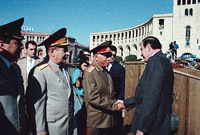Beginning in the previous editions
This is the last part of the “Non-election” series of articles. Those readers who were consistently reading the past eleven parts were waiting for two things – the end or a proposal. I must say that the expectations are not going to be met. There is not going to be an end and I don’t consider myself to be the one to make the proposal.
This series of articles is simply the composition of my observations on the past fifteen years. It is disputable, discussible and the more it becomes a topic for debate and discussion, the more we will move away from the end and get closer to the formulation of solutions.
Now I will talk about the end. I don’t think that my descriptions of the not too distant past have made the reader think about the end. Armenia, of course, is not going to disappear as a state. It is going to stay, but the question “how is it today and how is it going to be tomorrow” is a question that is always going to be a presentiment of the end, because if a country doesn’t have plans for the future, then it can only amaze or disappoint the international community representatives, whose problem is to make things correspond literally.
The end may come unexpected, the day after free, fair and transparent elections take place, when the political groups similar to one another and with no difference in ideologies end their campaigns.
Armenia has much more resources than the former Soviet Union, which used to occupy 1/6 of the world. The only truth which is familiar to us and is known to everyone is that it is impossible to always subordinate the people. You can deprive the person of his right or opportunity to be informed, but even the Soviet Communist government wasn’t able to deprive one of the ability to think, and killed millions of people for that purpose.
So, if the end is going to come, it is going to be the atrophy of the regular, homogenous system which may take long, but may also develop very fast because the homogenous system doesn’t have immunity or a functioning mechanism for resistance. Rapid development may take place by way of influences from the outside. For example, let’s say the international community imposes versions for the Karabakh conflict resolution that don’t benefit Armenia. The homogenous system, which totally leans on the victorious soldiers, will respond in a dry tone, but is there a corresponding potential to maintain honor and consistency with that response? If yes, what is that potential – the most efficient army of the region? How long, and what kind of war can the army fight in? Who can be its allies and what can it expect from the allies? How much time is needed for developing a successful economy with two-digit growth to serve the military front? How much time will be needed to get the economy back on its feet again?
The important thing, however, is not the evaluations. There is another important thing: why should the people who have won the war return to the battlefield without knowing what it is going to get out of it and what it is going to lose?
During the past three months, when the parts of “Non-election” were being printed, people were asking the same question, some with hope and some with panic: “What, do you want Levon Ter-Petrosyan to come back?”
“Why Levon Ter-Petrosyan?” I asked surprised.
“Then who?” they asked amazingly.
I must repeat Vano Siradeghyan’s thought and say unfortunately that after 1998, the only counterbalance of the political system of Armenia is one man who, after leaving, has not pronounced any political phrase during the past nine years.
I will ease the panic of those who are panicking and instill hope for those who have hope that Levon Ter-Petrosyan, as a person and a political individual, will never return. The main reason for him not coming back is the impossibility of his return which is due to the fact that Ter-Petrosyan’s proposed ideas were not in demand. If the idea of peace, rational and balanced politics were in demand, then we would have had a party which would set a goal to struggle for the secure future of Armenia a long time ago. That party had to be the first and sharpest critic of a society that wasn’t able to differentiate between what happened in the early 1990s and its notions of the national liberation struggle that began in the 1890s, and there is a huge difference.
That party had to be different from those who are trying to balance on a scale, babble about “rules and regulations”, don’t differentiate between their responsibility to the government from those who rule their neighborhoods, who talk nonsense about how much lice there is in children’s hair, who assure that the bright future of Armenia will only come by getting rid of “them” (the current government) and who are ready to work with anyone for the sake of getting rid of them.
That party had to show Armenia’s spot in this complicated and mixed-up region; where Armenia had to be the neighbor of all neighbors and a friend to all, instead of being the enemy of the neighbors and the outpost of the friend.
That party doesn’t exist and that is why Armenia is standing face-to-face with a non-election. The observers can come, observe and conclude that these National Assembly elections were more corresponding to what they had pictured. Next time they will be freer, fairer and more transparent. Perhaps one day Armenia will become the museum of free, fair and transparent elections and the visitors just won’t understand that what they are seeing is really a non-election.

